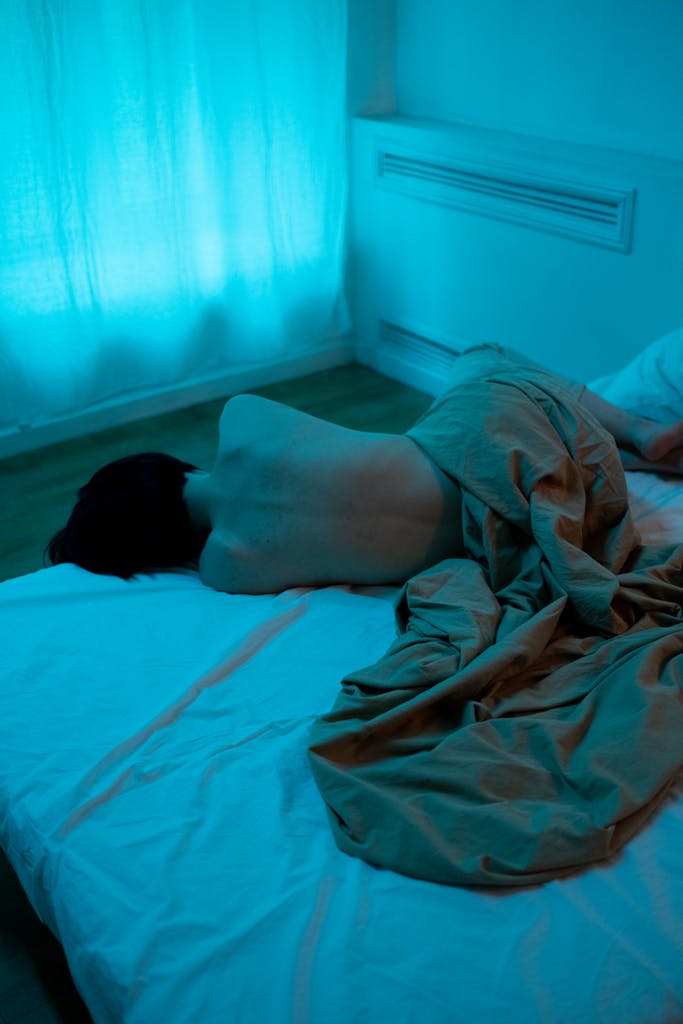FREE SHIPPING OVER $50
Struggling to Sleep? This Vitamin Deficiency Could Be to Blame
Sleep is essential for overall health, yet millions of people struggle with falling or staying asleep. While stress, screen time, and caffeine intake often take the blame, there’s another factor that’s frequently overlooked: vitamin deficiencies. Certain vitamins and minerals play a crucial role in regulating sleep, and if you’re lacking in them, your sleep quality may suffer.
So, could a simple nutrient deficiency be the reason you’re tossing and turning? Let’s dive into the science behind how vitamins impact sleep, which ones matter most, and how you can optimize your intake for better rest.
The Link Between Nutrition and Sleep

Your body relies on a delicate balance of hormones, neurotransmitters, and nutrients to regulate sleep. One of the most important players is melatonin, the hormone that signals your body when it’s time to sleep. Several vitamins and minerals contribute to the production of melatonin and other sleep-regulating compounds, such as serotonin and GABA (gamma-aminobutyric acid).
When your body is deficient in these key nutrients, falling and staying asleep becomes more difficult. You may experience restlessness, frequent wake-ups, or poor sleep quality, leading to fatigue and brain fog the next day.
Vitamin Deficiencies That Can Disrupt Your Sleep
1. Vitamin D – The Sunshine Vitamin for Sleep
Vitamin D is well known for its role in bone health and immune function, but research also links it to sleep quality. Studies suggest that low levels of vitamin D can lead to shorter sleep duration and increased sleep disturbances.
- How it affects sleep: Vitamin D influences the production of melatonin, and a deficiency has been linked to insomnia and daytime drowsiness.
- Signs of deficiency: Fatigue, mood swings, muscle weakness, and frequent colds.
- How to get more: Sunlight is the best natural source, but you can also get vitamin D from fatty fish, egg yolks, and fortified foods. If needed, supplements can help fill the gap.
2. Magnesium – The Natural Sleep Aid
Magnesium is often referred to as “nature’s relaxant” because it helps calm the nervous system and regulate melatonin production. A deficiency in magnesium has been associated with restless sleep, frequent waking, and even insomnia.
- How it affects sleep: Magnesium helps activate GABA, a neurotransmitter that promotes relaxation and deep sleep.
- Signs of deficiency: Muscle cramps, anxiety, irritability, and difficulty falling asleep.
- How to get more: Leafy greens, nuts, seeds, dark chocolate, and whole grains are great sources. Magnesium supplements like magnesium glycinate or citrate are also highly absorbable options.
3. Vitamin B6 – The Serotonin Booster
Vitamin B6 is essential for producing serotonin, a neurotransmitter that helps regulate mood and sleep. Since serotonin is a precursor to melatonin, a deficiency in B6 can interfere with your sleep cycle.
- How it affects sleep: Without enough B6, your body struggles to convert serotonin into melatonin, making it harder to fall asleep.
- Signs of deficiency: Depression, irritability, low energy, and trouble staying asleep.
- How to get more: Bananas, poultry, fish, potatoes, and fortified cereals contain B6. Supplements may be useful, especially for people with absorption issues.
4. Iron – The Fatigue Fighter
Iron deficiency, particularly in people with anemia, is often linked to restless leg syndrome (RLS), which can severely impact sleep. Low iron levels also contribute to daytime fatigue and poor sleep efficiency.
- How it affects sleep: Iron is necessary for proper oxygen transport and dopamine regulation, both of which influence sleep.
- Signs of deficiency: Fatigue, pale skin, shortness of breath, and restless legs at night.
- How to get more: Red meat, lentils, spinach, and fortified cereals are excellent iron sources. If deficient, iron supplements may be recommended by a doctor.
5. Calcium – The Sleep Cycle Regulator
Calcium plays a crucial role in the production of melatonin, and low levels have been linked to poor REM sleep and insomnia. Studies suggest that calcium helps the brain use tryptophan, an amino acid that aids in melatonin production.
- How it affects sleep: Calcium works alongside magnesium and vitamin D to promote deep sleep.
- Signs of deficiency: Muscle cramps, difficulty sleeping, and brittle nails.
- How to get more: Dairy products, leafy greens, almonds, and sardines provide calcium. Supplements may be necessary for those with low intake.
How to Fix Vitamin Deficiencies for Better Sleep
If you suspect that a vitamin deficiency is impacting your sleep, here are some practical steps to restore balance:
- Eat a Balanced Diet: Focus on whole foods rich in sleep-supporting vitamins and minerals.
- Get Enough Sunlight: Aim for at least 15-30 minutes of sunlight per day to maintain healthy vitamin D levels.
- Consider Supplements: If your diet isn’t meeting your needs, high-quality supplements can help bridge the gap.
- Improve Gut Health: A well-functioning gut ensures proper nutrient absorption, so include probiotic-rich foods like yogurt and fermented vegetables.
- Monitor Caffeine and Alcohol Intake: Both can interfere with vitamin absorption and disrupt sleep cycles.
Best Supplements for Sleep Support
If improving your diet alone isn’t enough, these supplements can help improve sleep quality:
- Vitamin D3: If you’re not getting enough sun exposure, a daily supplement can help maintain optimal levels.
- Magnesium Glycinate: This form of magnesium is highly absorbable and promotes relaxation.
- B Complex Vitamins: A B6-rich complex can help with serotonin production.
- Iron (if deficient): If blood tests confirm low iron, supplementation under medical supervision is essential.
- Calcium & Magnesium Combo: Many supplements combine these minerals to support relaxation and muscle function.
Can Fixing a Vitamin Deficiency Improve Your Sleep?
Absolutely. Vitamins and minerals play a key role in regulating sleep, and deficiencies can lead to insomnia, restless nights, and daytime fatigue. If you’ve tried everything to improve your sleep with no luck, checking your nutrient levels could be the missing piece of the puzzle.
By optimizing your diet, considering supplements if needed, and maintaining a healthy lifestyle, you can restore balance and finally get the deep, restful sleep your body needs.
Related Articles
- Feed Your Hair: 10 Best Vitamins for Longer, Stronger Strands
- 5 Supplements That Won’t Help You Live Longer (Sorry, But You’re Wasting Your Money)
- The Anti-Aging Supplement You Should Add to Your Coffee—Skin Benefits You’ll Love
- 10 Vitamin Brands That Deliver Results (And Aren’t Just Hype)
- The Top Dietary Supplements Everyone’s Buzzing About (And Why You Should Care)







